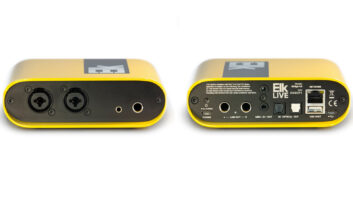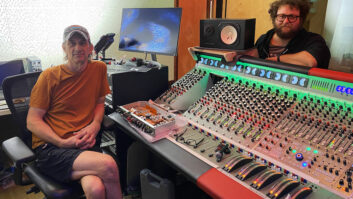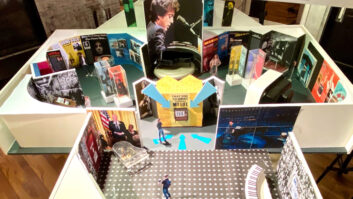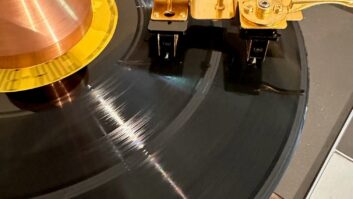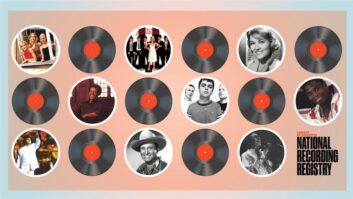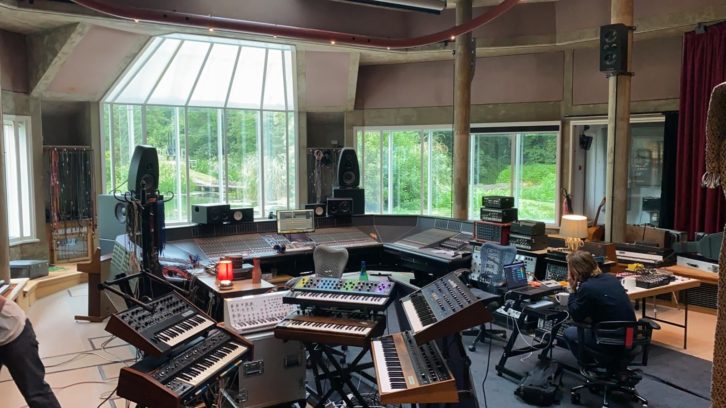
Whether you’re a believer in cosmic coincidences, astrological occurrences, mythological symbolism, spiritual significance…or not, the number 7 holds a special place in the order of the universe. This proved to be the case with Foals’ seventh studio album, Life Is Yours, the follow-up to the career-defining double album Everything Not Saved Will Be Lost (2019), the group’s first Number One in its native UK. It also snagged them their third Mercury Prize nomination. Despite these critical and commercial accomplishments, Life Is Yours shrugs off all the elements that came before.
“We kind of have an allergic reaction to ourselves,” says Foals frontperson Yannis Philippakis, Zooming in between European tour dates. “We did a double album with me as producer with an engineer in one place, and it was arduous. It took almost two years. Instead, we’ve worked with four producers, two mixers, in a much shorter space of time, and came up with a record that is much more concise.”
The writing for Life Is Yours began during the first pandemic lockdown in early 2020, with the newly pared down members in different locations. Bass player Walter Gervers and keyboard player Edwin Congreave parted with the band soon after Everything Not Saved...; the remaining three— Philippakis, drummer Jack Bevan and guitarist Jimmy Smith—worked on material separately until they were able to be in the same room.
“We keep it pretty crude in the early stages,” says Philippakis. “I don’t think it’s good to get too attached. There are sounds from early Logic demos that are on the final record, some of the original stuff I did on ‘2am.’ I’m very, very bad at recording myself on the computer, but some of those elements made it all the way to the end.”
While recording these “phone demos,” they were also sending the files to key producers, including Dan Carey (Hot Chip, Wet Leg), Miles James (Tom Odell, Little Simz), A.K. Paul (Sam Smith, Jessie Ware) and two-time Grammy Award Producer of the Year nominee John Hill (Rihanna, Imagine Dragons). The latter served as Life Is Yours’ overarching producer. “We didn’t want mono culture on the record,” says Philippakis. “We didn’t want to be in one studio with one producer and have all the songs approached in the same manner. We wanted to have a kaleidoscopic array of ideas and inputs that can’t come from one person. We felt that the material deserved it.”

Instead of recording the album within a set block of a few weeks, Foals did short sessions of two or three days. “One of the massively beneficial things with this way of working was that we could assess the results,” says Philippakis. “If there was something that we didn’t think was correct as a band privately, we wouldn’t continue down that path.”
The group experienced very different ways of working with each producer. Conversely, Carey, with his hefty discography, has different approaches depending on the artist, and for Foals, he employed his modular wall.
“We would very casually start playing a groove,” remembers Philippakis. “[Carey] starts moving around all these amps. The studio is in his house, so he knows everything in it. You don’t even take your own amps to Dan Carey’s; you just literally walk up with a guitar, maybe a bass. Before you know it, your guitar is going through his entire huge modular wall. It’s being sidechained live and coming back into the room and being recorded with another mic, and it’s being sidechained live by Jack’s drums. All of a sudden, you’re meeting a version of the song he’s reflecting back at you and recapturing that secondary version and then re-sampling that later on that day. You start to play to a sampled version of yourself and it’s amazing.”
In the spirit of not staying in one place, Foals decamped to The Kinks’ Konk Studios in London with James—their first formal recording session for Life Is Yours. The idea was to have a three-day session—but accomplish a lot.
“We’d heard about Miles before we’d worked with him, and people said he gets deep,” recounts Philippakis. “The extent of the drum and groove perfectionism is definitely worth noting. I’m not exaggerating when I say after a day and a half, we were still searching for the perfect drum sound. The level of detail and experience and ear and feel that Miles goes into is absolutely mindboggling. It was like an M.C. Escher painting. We went further and further into the labyrinth, and that was amazing. I think you can hear how good the drums sound in the end.”
When it came to Paul, it was a psychological exercise in managing musicians’ attachment to their material. “I will overburden every song just out of excitement,” says Philippakis. “I like music, so I like to put a lot of music in the songs and lots of ideas. I can overload the song if I’m left to my desires and if they indulge me.
“The way A.K. dealt with me was he allowed every idea space, but he would only give it a bar,” he continues, “If you listen to ‘2001,’ there are probably eight to 10 little sonic or melodic ideas that are given a tiny little snapshot. There’s a little detail that will pop out. That, for me, is something that I play for bars and bars. He’ll let you do it, but give you such a tight parameter within the song, which I thought was super cool. It’s like a photo flash going off.”
IDLES Finds Room to Explore at Real World Studios
By the time Foals went to Peter Gabriel’s Real World Studios in Bath, England, with Hill in the summer of 2021 for five weeks, Life Is Yours was “70 percent done.” James was present for most of the Real World sessions, and Carey also came by. Anything that was completed was sent to Paul, just so it could “go through ‘A.K.’s world,’” according to Philippakis.
Sonic layers were added and Philippakis’ vocals were recorded at Real World, with Hill’s hitmaking touch. Says Hills of Philippakis’ process, “There are multiple takes with multiple different characters in them. There would be softs, falsettos, more shouty vocals. We worked in the Big Room at Real World which is really live and roomy. You can really hear that in some of the vocal performances. We had multiple mics and room mics, and tried different setups.”
After Real World, Hill further worked on the songs on his own, and again with Philippakis, before sending the tracks to mixers, Mark “Spike” Stent and Manny Marroquin. “We spent a lot of time getting it close to where the band wanted it, trying to figure out how to take the stuff from the roughs as a jumping off point and then elevate them from there,” says Hill. “Spike and Manny are relatively close to me, so I was able to go and sit with them.”
“I did not attend any of the mixes in-person, but I was pretty involved in terms of the amount of comments,” says Philippakis. “I feel like we were fairly exhausting to work with on the mixes. We were probably driving them a bit crazy, but it has to be right for us. We’d worked so long. The problem with remote working is that language is sometimes a poor medium to explain musical things.”
Life Is Yours was mixed half-and-half by Marroquin and Stent, without either of them hearing the other’s work. This was not to keep them competitive, but to stop them from coloring each other’s approaches.
Says Philippakis, “The thing I find remarkable about the record is that it sounds very cohesive. It’s actually one of the more unified records we’ve made.”
